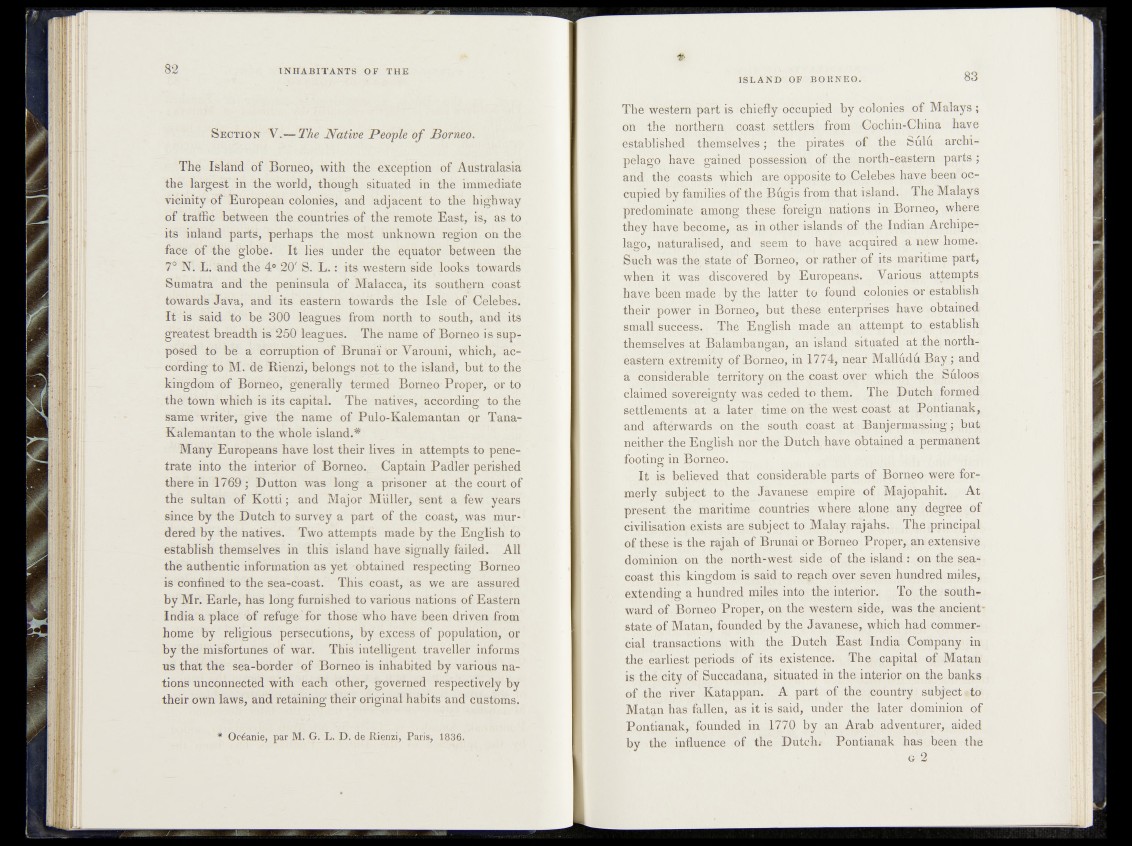
82 INHABITANTS OF THE
Section V.— The Native People o f Borneo.
The Island of Borneo, with the exception of Australasia
the largest in the world, though situated in the immediate
vicinity of European colonies, and adjacent to the highway
of traffic between the countrie&^f the remote East, is, as to
its inland parts, perhaps the most unknown region on the
face of the globe. It lies under the equator between the
7° N. L. and the 4° 20' S. L .: its western side looks towards
Sumatra and the peninsula of Malacca, its southern coast
towards Java, and its eastern towards the Isle óf Celebes.
It is said to be 300 leagues from north to south, and its
greatest breadth is 260 leagues. The name of Borneo is supposed
to be a corruption of BrunaïórVarouni, which, according
to M. de Rienzi, belongs not to the island, but to the
kingdom of Borneo, generally termed Borneo Proper, or to
the town which is its capital. The natives, according to the
same writer, give the name of Pulo-Kalemantan or Tana-
Kalemantan to the whole island.*
Many Europeans have lost their lives in attempts to penetrate
into the interior of Borneo. Captain Padler perished
there in 1 769; Dutton was long a prisoner at the court of
the sultan of Kotti; and Major Mfiller, sent a few years
since by the Dutch to survey a part of the coa&f,, was ,mur- jj
dered by the natives. Two attempts made by the English to
establish themselves in this island have signally failed. All
the authentic information as yet obtained respecting Boriieo
is confined to the sea-coast. This coast, as we are assured
by Mr. Earle, has long furnished to various nations of Eastern
India a place of refuge for those who have been driven from
home by religious persecutions, by excess of population, or
by the misfortunes of war. This intelligent traveller informs
us that the sea-border of Borneo is inhabited by various nations
unconnected with each other, governed respectively by
their own laws, and retaining their original habits and customs.
* Océanie, par M. G. L. D. de Rienzi, Paris, 1836.
ISLAND OF BORNEO. 83
TheiwteteWfart is -chiefly occupied by colomes-i of Malays ;
on the northern coast . .settlers^ from -^chin-China have
established themselvesspi»'th<e4^i^afes of the' Sülu . archipelago
have gained. possession» qfsfebe north-^^fein parts;
and the coasts which aie opposite to Gelebes hav.e been bpr
cupied by familiesff the Bugis from that island. The Malays
predominate among these foreign nations in Borneo, where
they have become, as in other islands'of th,e Indian-Archipelago,
naturalised, and* seem to hafee acquired a ftpw horpe.\
Such was the state of Borneo,, or rather of its maritime part,
when it was discovered by Europeans. Various attempts
havé been made by the latter to found çolso piest or establish
their fower in Borneo.,! but these emterpsrises^hasp, obtained
small sucéess'.. The English made an attempt to establish
themsqlves at Balambangan, an island, situated at Jhe^ northeastern
extremity of Borneo, in 1774, near Mallfi^u Bay ; and
a considerable' territory on the coast q^r.-.which, the^^uloos.
claimed sovereignty was ceded to tjiem. The Dutch formed
settlements at a later time, on 'the wçst-coast, at
and afterwards on the south coast at Baqjerma^sing ; but
neither .the English nor the Dutch, have obtainecl a permanent
footing in Borneo. -
It is believed that considerable* parts of Borneo-were formerly
subject to the Javanese .J|mpirê of. Majppabit. At
present the maritime countries where alope, any. .degree of
civilisation exists are subject to Malay: rajahs. The principal
of these is the rajah of Brunai or Borneo Proper, an extensive
dominion on the north-west sidp, of the island : on the sea.-;
coast this kingdom is said to repch over, spvefi hundred miles,
extending a hundred miles into theinferior. To the south?-
ward of Borneo Proper, on the western side, was the ancient*
state of Matan, founded by the Javanese, which had. commercial
transactions with the Dutch East India Company: in
the earliest periods of its existence. - The capital of Matan
is thé city of Succadana, situated in the interior on the banks
of the river Katappan. A part <of the country- subject «to
Mat^n has fallen, as it is "said, under the later dominion of
Pontianak, founded in l]7() by an Arab adventurer, aided
by the influence of the Dutch* Pontianak has been the
g 2